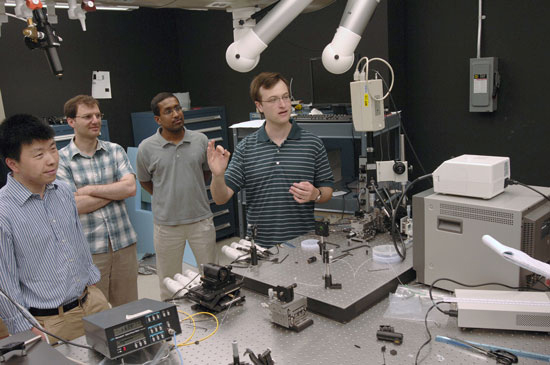Preble Wins Prestigious Defense Department Young Investigator Awards
Recognition given to new faculty-scientist for research into Nanophotonics
A. Sue Weisler
Stefan Preble, recent winner of two prestigious Department of Defense young investigators research awards, works closely with students in the RIT Nanophotonics lab in the Kate Gleason College of Engineering.
Stefan Preble, assistant professor of microsystems engineering at Rochester Institute of Technology, was awarded two of the U.S. Defense Department’s most prestigious honors, the Defense Advanced Research Projects Agency Young Faculty Award and the Air Force Office of Scientific Research Young Investigators Research Program Award.
The awards are given to up-and-coming scientists, engineers and new tenure-track faculty who have focused research on next generation technologies that will significantly advance national defense.
“I’m honored to receive both of these awards. They will enable me to develop revolutionary photonic technologies that are integrated on low-cost silicon chips,” says Preble, who came to RIT two years ago from Cornell University, where he did his graduate work. “The awards recognize work I’ve done in this area and the potentially high impact of the devices my research group is developing.”
Preble was awarded the Defense Advanced Research Projects Agency Young Faculty Award to realize a low-powered ultra-high speed silicon electro-optic modulator. “Electro-optic modulators are one of the basic building blocks of photonics; they translate electronic information into the photonic domain,” he says. There are currently limits in both the technology and the materials that this research looks to dramatically improve, such as bandwidth, power and size, he explains.
The Air Force Young Investigators Award was given to Preble for his investigative work on dynamic silicon nanophotonics, a new technique for efficiently controlling light by dynamically tuning optical cavities.
“You can think of a guitar string as the acoustic equivalent of an optical cavity. By plucking and changing the length of a guitar string you can create a rich set of sounds. We can do exactly the same thing to light by ‘plucking’ optical cavities,” he says. “Dynamic nanophotonics enables unprecedented control of the properties of light, from its color to its speed, yielding optical memories, diodes and arbitrary waveform processors.”
In 2007, Preble returned as a faculty member to RIT where he received a bachelor’s degree in electrical engineering in 2002. He leads the RIT Nanophotonics Group, a laboratory team developing high performance nanophotonic devices on a silicon chip which will find applications from enhancing computer chips to biotechnology.
“Dr. Preble is one of the top young researchers in the country working in the fields of nanophotonics and microsystems. His accomplishments in these two highly competitive and prestigious programs bears this out,” says Bruce Smith, professor and director of the RIT microsystems engineering program in the Kate Gleason College of Engineering.
The objectives of the DARPA and Air Force Awards are to identify and engage rising research faculty, currently in tenure-track positions, and to expose them to Department of Defense initiatives. The program provides funding, mentoring and professional contacts to faculty early in their careers. Each year, the two award groups receive in excess of 300 proposals; less than a third of the applicants receive grant awards.







